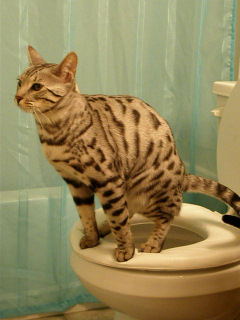Avoid Flush Cat Poop Down Your Toilet - Preserve Your Home's Plumbing Integrity
Avoid Flush Cat Poop Down Your Toilet - Preserve Your Home's Plumbing Integrity
Blog Article
What're your insights and beliefs about Can You Flush Cat Poop Down The Toilet??

Introduction
As feline owners, it's important to be mindful of exactly how we get rid of our feline buddies' waste. While it may appear convenient to purge feline poop down the toilet, this technique can have destructive repercussions for both the environment and human wellness.
Alternatives to Flushing
Fortunately, there are more secure and a lot more liable ways to deal with cat poop. Think about the adhering to choices:
1. Scoop and Dispose in Trash
The most usual technique of dealing with pet cat poop is to scoop it into an eco-friendly bag and throw it in the garbage. Be sure to utilize a dedicated trash inside story and get rid of the waste promptly.
2. Use Biodegradable Litter
Go with naturally degradable pet cat litter made from products such as corn or wheat. These clutters are environmentally friendly and can be securely dealt with in the trash.
3. Hide in the Yard
If you have a backyard, consider hiding pet cat waste in an assigned location far from vegetable gardens and water resources. Be sure to dig deep sufficient to prevent contamination of groundwater.
4. Set Up a Pet Waste Disposal System
Buy a pet waste disposal system especially designed for feline waste. These systems utilize enzymes to break down the waste, reducing odor and environmental effect.
Wellness Risks
Along with ecological concerns, flushing feline waste can likewise posture health risks to people. Feline feces might contain Toxoplasma gondii, a parasite that can create toxoplasmosis-- a possibly severe disease, especially for expectant females and people with damaged immune systems.
Environmental Impact
Flushing feline poop presents damaging microorganisms and bloodsuckers right into the water, posing a significant risk to aquatic environments. These pollutants can adversely affect aquatic life and compromise water quality.
Conclusion
Responsible pet ownership expands past giving food and sanctuary-- it additionally entails correct waste administration. By avoiding purging pet cat poop down the bathroom and selecting alternate disposal techniques, we can reduce our environmental footprint and protect human wellness.
Why Can’t I Flush Cat Poop?
It Spreads a Parasite
Cats are frequently infected with a parasite called toxoplasma gondii. The parasite causes an infection called toxoplasmosis. It is usually harmless to cats. The parasite only uses cat poop as a host for its eggs. Otherwise, the cat’s immune system usually keeps the infection at low enough levels to maintain its own health. But it does not stop the develop of eggs. These eggs are tiny and surprisingly tough. They may survive for a year before they begin to grow. But that’s the problem.
Our wastewater system is not designed to deal with toxoplasmosis eggs. Instead, most eggs will flush from your toilet into sewers and wastewater management plants. After the sewage is treated for many other harmful things in it, it is typically released into local rivers, lakes, or oceans. Here, the toxoplasmosis eggs can find new hosts, including starfish, crabs, otters, and many other wildlife. For many, this is a significant risk to their health. Toxoplasmosis can also end up infecting water sources that are important for agriculture, which means our deer, pigs, and sheep can get infected too.
Is There Risk to Humans?
There can be a risk to human life from flushing cat poop down the toilet. If you do so, the parasites from your cat’s poop can end up in shellfish, game animals, or livestock. If this meat is then served raw or undercooked, the people who eat it can get sick.
In fact, according to the CDC, 40 million people in the United States are infected with toxoplasma gondii. They get it from exposure to infected seafood, or from some kind of cat poop contamination, like drinking from a stream that is contaminated or touching anything that has come into contact with cat poop. That includes just cleaning a cat litter box.
Most people who get infected with these parasites will not develop any symptoms. However, for pregnant women or for those with compromised immune systems, the parasite can cause severe health problems.
How to Handle Cat Poop
The best way to handle cat poop is actually to clean the box more often. The eggs that the parasite sheds will not become active until one to five days after the cat poops. That means that if you clean daily, you’re much less likely to come into direct contact with infectious eggs.
That said, always dispose of cat poop in the garbage and not down the toilet. Wash your hands before and after you clean the litter box, and bring the bag of poop right outside to your garbage bins.
https://trenchlesssolutionsusa.com/why-cant-i-flush-cat-poop/

As a fervent person who reads about Don’t flush cat feces down the toilet, I was thinking sharing that portion was beneficial. Sharing is nice. One never knows, you could be doing someone a favor. Thank you for your time. Don't hesitate to check up our site back soon.
This Website Report this page